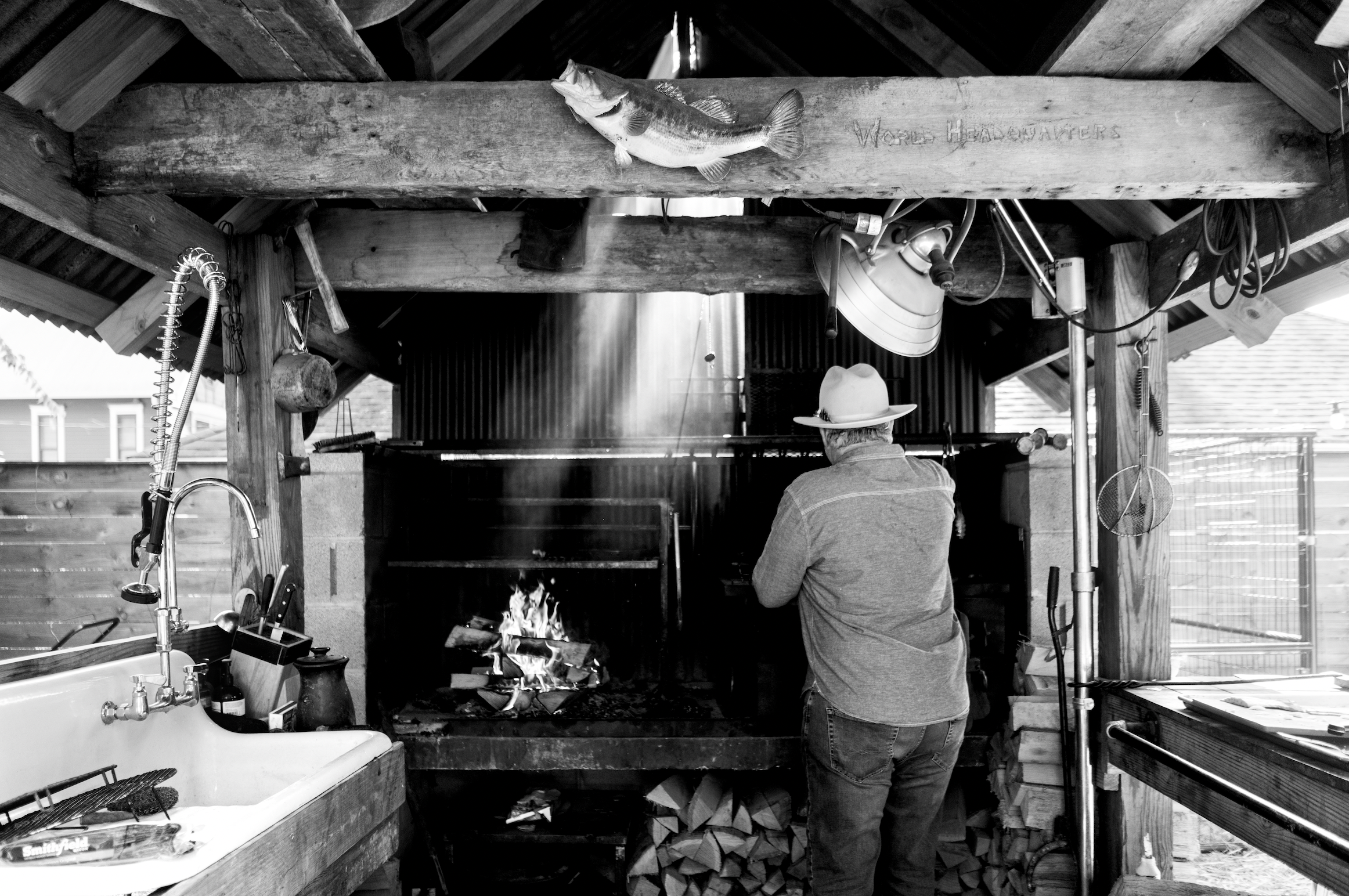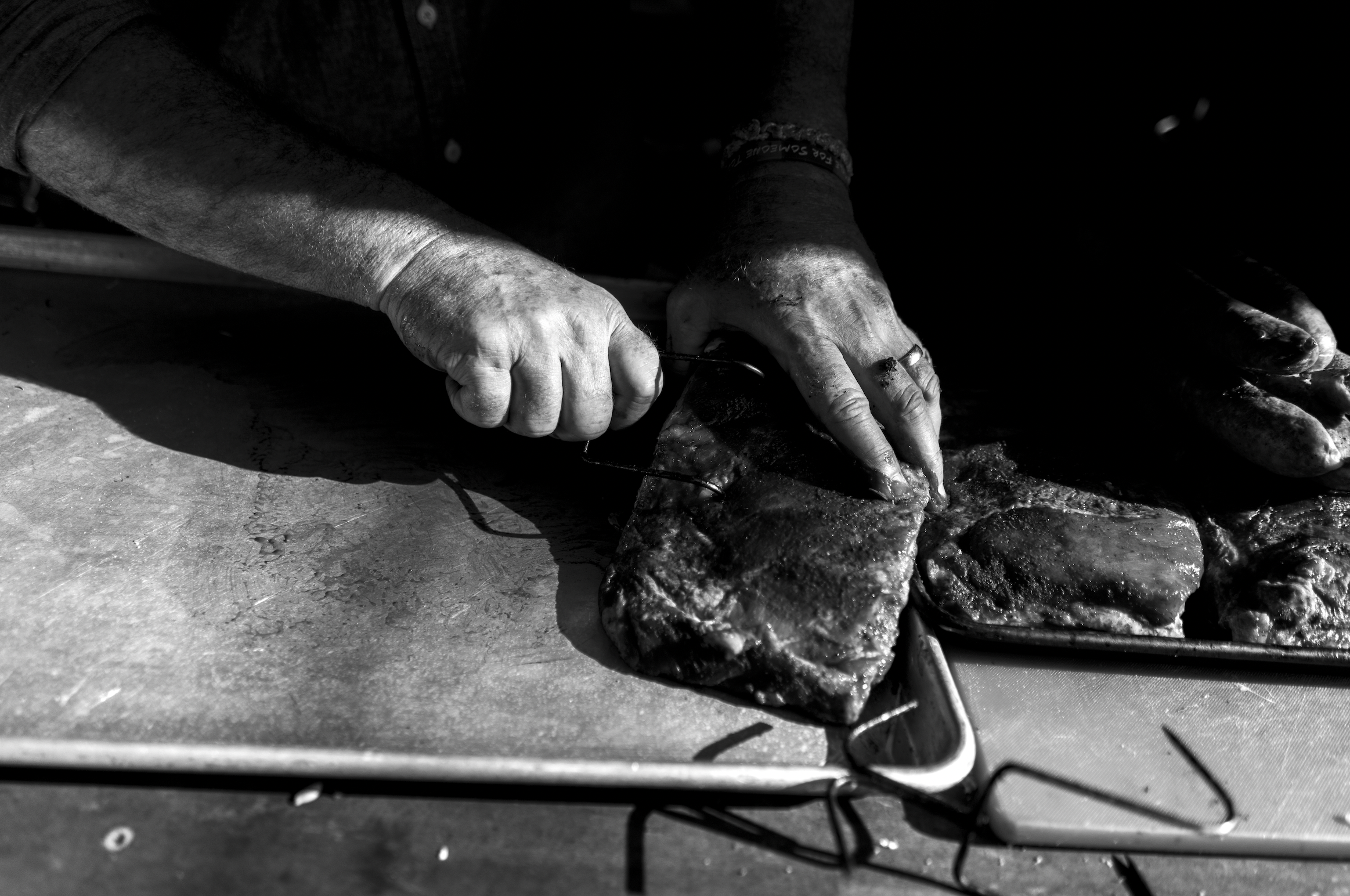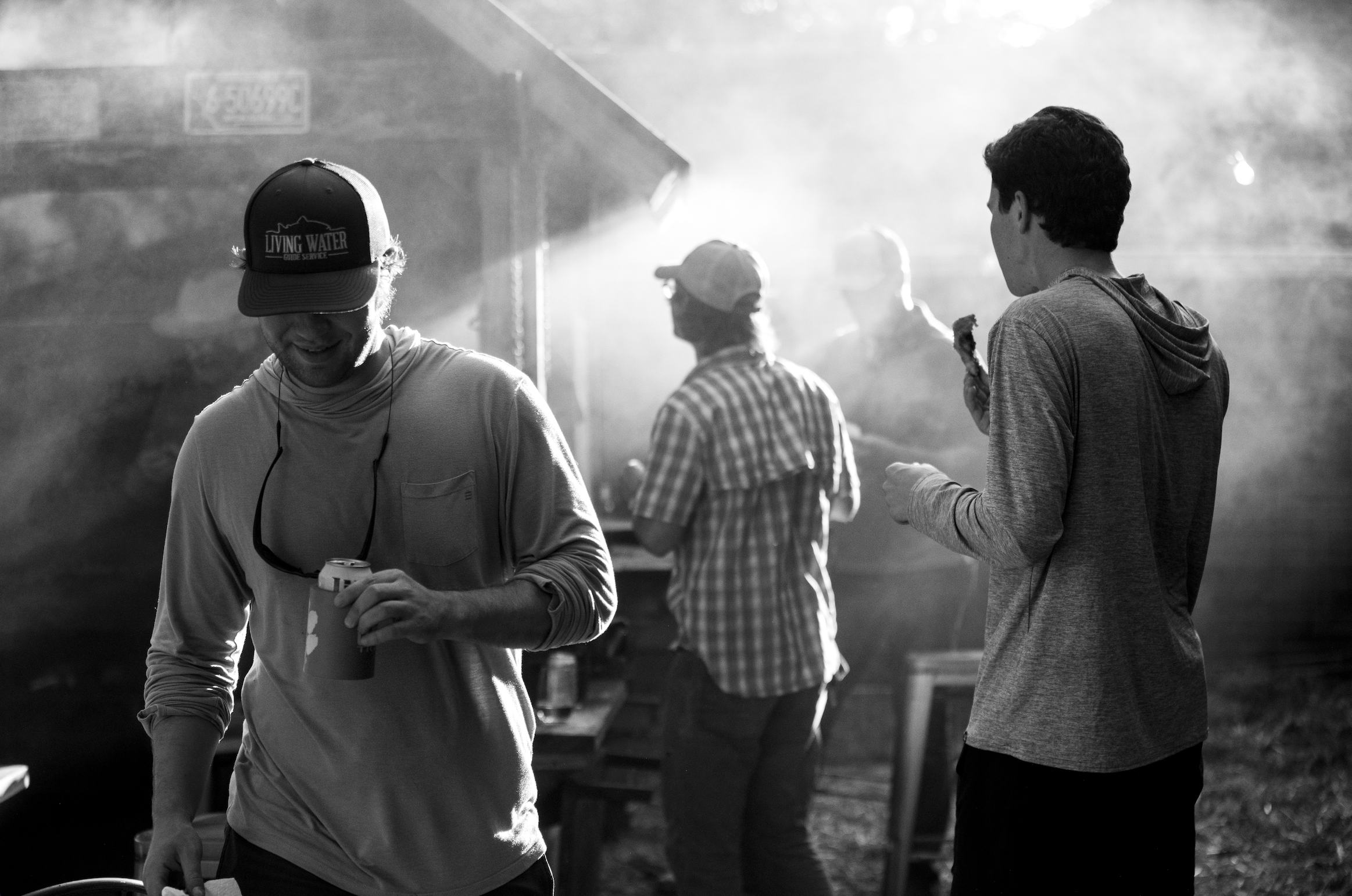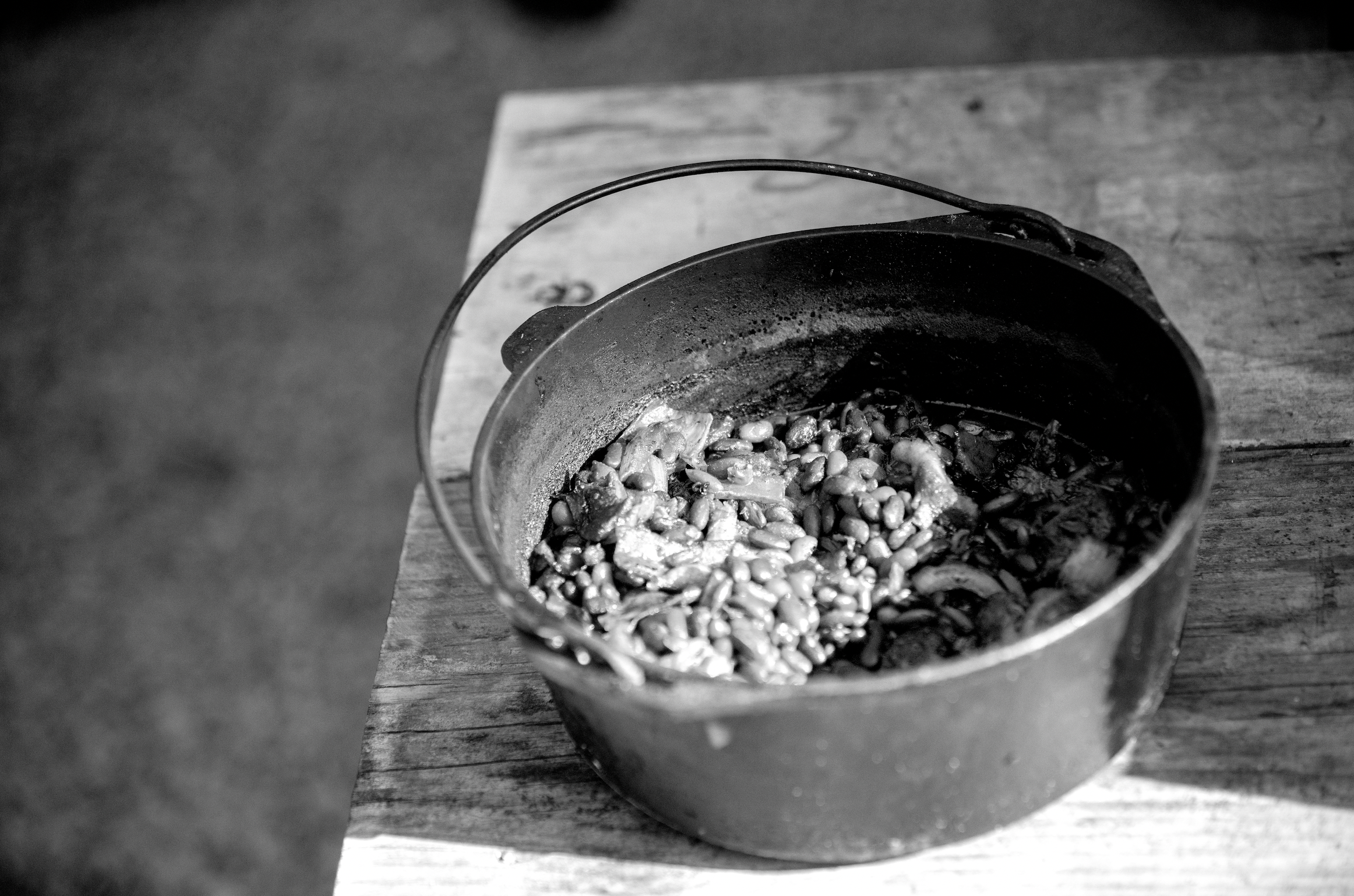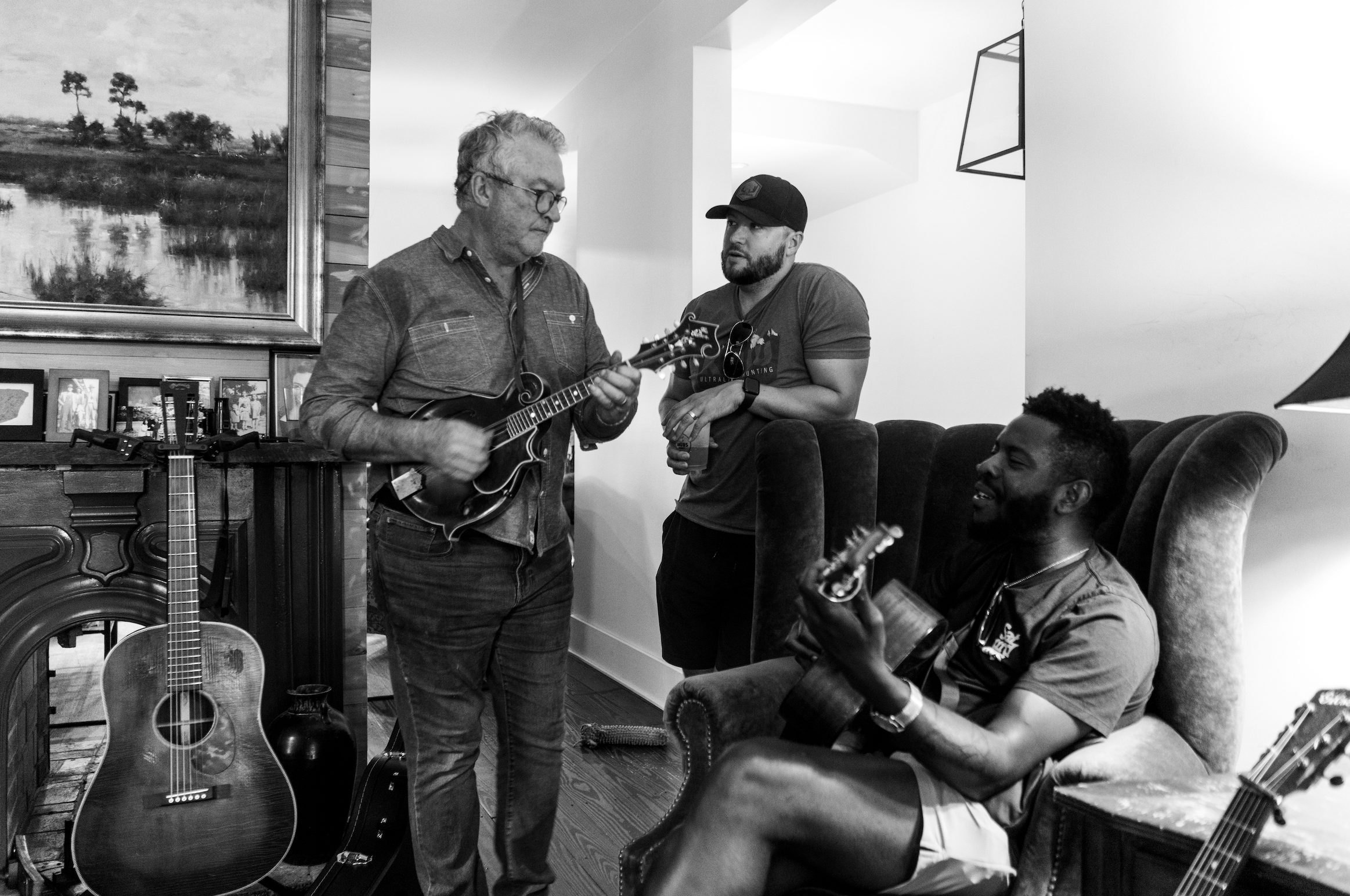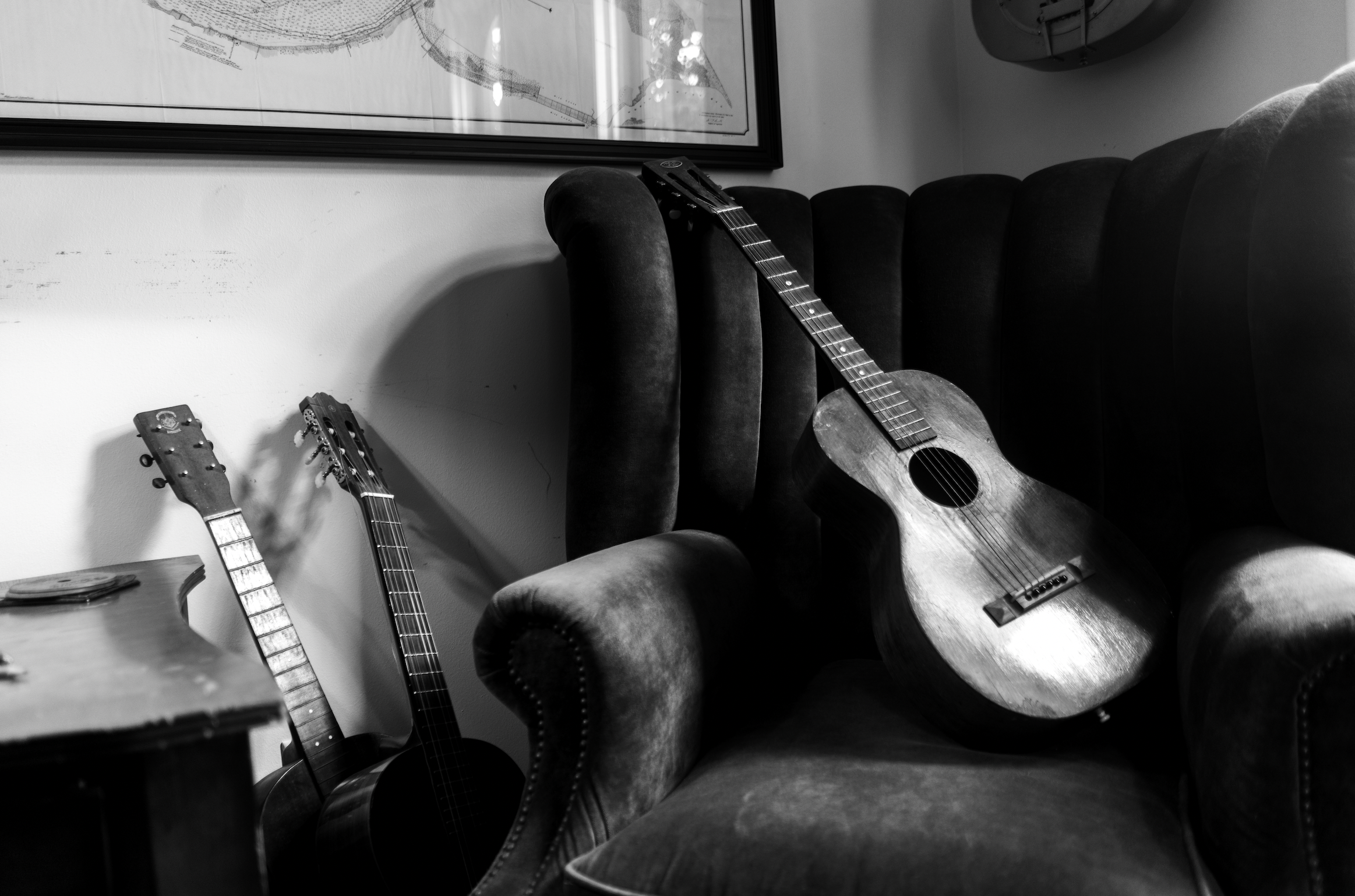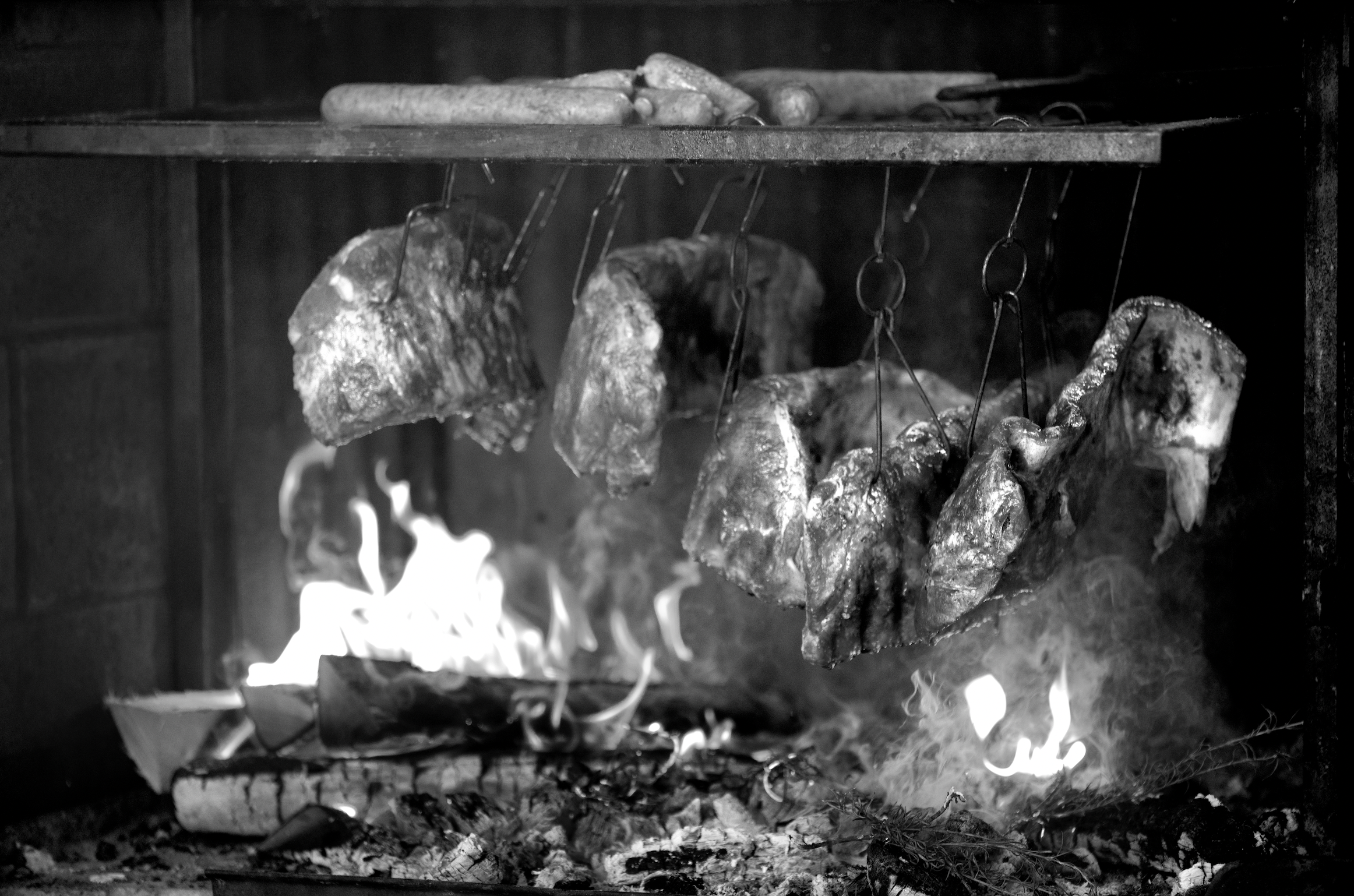Here Under Heaven
Award-winning songwriter Phillip Lammonds brings together musicians and friends for world-class cooking, songwriting, and storytelling at World Headquarters.
By Scott Gould | photography by brooke stevens
I have come to Tennessee on a mission. I’ve come to lay eyes on the World Headquarters. I’ve only seen the World Headquarters in pictures and videos, mostly on social media channels.
And of course, I’ve heard the stories about the place. Quasi-mythic tales of how World HQ provides respite for weary country music songwriters and friends and neighbors who enjoy their ribs smoky and bacon in their baked beans. Granted, it’s not the optimum time for me to visit East Nashville. I’m fogged with lingering effects of a Covid bout, and my stomach has been doing the Pepto-Bismol somersaults since I climbed on the plane. But when one has the chance to make the pilgrimage to the World Headquarters and hang out with its founder, Phillip Lammonds, one does not hesitate. One simply packs extra pink stuff.
Phillip has invited me to be a fly on the wall at the World Headquarters, to spend a day soaking up the stories and the smoke. “But don’t tell anyone where it is,” he says, grinning. “We can’t handle that kind of crowd.” So I’ll offer this breadcrumb for you to follow, if you so desire: the World Headquarters is just down the street from the small, nondescript house where outlaw Jesse James holed up in the late 1800s for a few years, after pulling the Northfield, Minnesota, bank job. Enough said.
Phillip Lammonds is a songwriter—a very successful songwriter—in a town that rises and falls on the fortunes of country music, but he’s a relatively recent migrant to Tennessee. A native of Appalachian North Carolina, he transplanted one state south when he came of age, and after college in the late 1980s, he helped form the popular, ubiquitous band, the Blue Dogs. (Go ahead, ask anybody who was young and a fan of live music in the Southeast in the late ’80s and ’90s—the Blue Dogs probably played their frat party or showed up on the marquee at the local rock club.) Phillip spent a large chunk of his years in the South Carolina Lowcountry. There, post-Blue Dogs, he and his wife, Rebecca (Rebecca of the constant, radiant smile that illuminates the friendly confines of the World Headquarters), raised a family on the coast, in Georgetown and on Pawleys Island, where Phillip carved out a quite successful real estate career. He was also an outdoor guide, a falconer, a hunter, a fly fisherman, an amateur chef—and he was always writing music. (As one of his country-music friends whispers to me in a confidential corner of the World Headquarters, “Phillip ain’t but one guy, but hell, he’s already lived like a dozen lives. Don’t know how he has the time.”)
Ah, but the music—that was the itch he could not scratch into submission. Once he started writing songs for the Blue Dogs, he opened a door that refused to shut. Two or three times a year, Phillip would pack up his guitar and make tracks from the Carolina coast to Nashville and hang out for several days, working out country songs with various members of the songwriting community. (Because, you see, unlike writing magazine articles, songwriting in Nashville is a collaborative creative act, two or three people locked in a room, bouncing lines and images and ideas off the wall until something sticks and becomes an audio story, framed by a few verses, a chorus, and a bridge. Or, as Country Music Hall of Fame member Harlan Howard supposedly once said, “Three chords and the truth.”)
Phillip was making his name in the Nashville songwriting world. Songs he wrote or co-wrote were cut by country stars Darius Rucker, Blake Shelton, Lee Brice, Kellie Pickler, Mo Pitney, Dylan Scott . . . . and the list continued to grow. Then, six years ago, his 600-mile commutes ended. Phillip signed a publishing deal with Curb Music in Nashville, and he and Rebecca (and their kids, Cooper and Martha Grace) moved down the street from Jesse James’s place into a house built in 1896. He became a full-time country songwriter, spending his days with his creative compatriots in the writing rooms at the Curb Music offices on Music Row or in the sun-splashed front room of his house, working up songs with other writers or neighbors like Pam Tillis.
Yet, there was no World Headquarters when Phillip and his family first arrived in East Nashville. “That came about during the pandemic,” Phillip says. “Right after the tornado, really.” In the early months of 2020, Nashville was dealt a deadly combination punch. During the first week of March, just as the world was beginning to lock down due to this new, then-mysterious virus, a devastating tornado ripped through Nashville, its path wavering within a few hundred yards of his home. In the days following the storm, as Phillip roamed his neighborhood, checking on friends, he noticed the lumber piled on the street, waiting to be carted away. He decided to do something with a few scraps of it, perhaps as a tribute of sorts to life before the storm. He also recalled a heavy, iron door he’d scrounged from a foundry at some point. He decided to build a rustic, open-air cookhouse in his backyard and construct it around that substantial iron door. As he says, “World Headquarters is all about that door.”
He scavenged odds and ends from other sources, as well. Cross beams from a dilapidated barn on Lee Brice’s farm, a retiring dentist’s examination light from the local dump, roofing tin left over from nearby construction. Soon, a cookhouse rounded into shape. A counter for chopping and prepping. An open pit with a pull-chain flue and a metal wheel to raise and lower the grill. The whole operation had a wonderfully odd Rube Goldberg quality about it, held together with clamps and lag bolts and cement block. And that iron door anchored everything—the fire, the bricks, the beams.
“We started inviting folks over,” Phillip says. “People said we should name the place. They threw out a lot of names. Then somebody said something that stuck.” He points to a beam above his head. Into one of Lee Brice’s repurposed beams, he’s carved the words, WORLD HEADQUARTERS.
“Time to start the Pentecostal slaw,” Phillip says and disappears into the house.
My day as a fly on the World Headquarters wall begins mid-morning, at Phillip’s front door, where I’m greeted by his entourage: a Springer spaniel named Muddy and Muddy’s shadow, the four-month-old Beagle puppy, Ruby. The two of them corkscrew between my legs as Phillip leads me in, past the front room ringed with amps and guitars—vintage Gibsons, a Gold Top Les Paul, a Martin or two, a couple of mandolins. The sun streams through the big windows and lights up the well-worn baby grand in the corner. In the kitchen, a familiar smell catches my stomach on a downbeat. I’m not sure I’m ready for food or drink or anything other than over-the-counter pink stuff, but it’s a comfortable aroma. Phillip sees me sniffing and points at a cast-iron pot on the burner. “The baked beans are getting there,” he says. “Let me show you the shed.”
Outside, I sit on a metal stool at the rustic counter while Phillip recites the history of the cookhouse, how the pandemic and the tornado led him to create the place he’s dubbed World Headquarters. As he talks, I feel myself start to ease into the space. You can do that in places that give off good vibrations. Places with the right kind of character do have a palpable sensation. You can tell once you settle in if your skin feels comfortable where you’re sitting, and the cookhouse somehow reaches around you and tugs you down. My stomach begins to feel better.
In fact, when Phillip starts shredding cabbage and carrots and onions for the Pentecostal slaw (named so because the recipe appears in the ancient Shingle Hollow Campground Women’s Missionary Council Favorite Recipes cookbook, a publication of the local Pentecostal church in Shingle Hollow, North Carolina), I don’t reach for the Pepto in my backpack. Things are settling.
When Phillip cooks or tells stories or plays songs, he doesn’t move fast. He operates at his own speed. Our conversation turns to songwriting. He is one of those folks who knows that creativity flows better when buoyed by a regular schedule. “Every day, I get up early, fix a cup of coffee, grab one of those guitars and sit in that big chair and see what happens. People ask me, ‘Don’t you ever take a break from writing songs?’ No, I tell them, I can’t do that. My goal with songwriting was always to be in it and worthy of it. That’s why I’m doing this.” Phillip’s few thousand followers on Instagram are given an inside glimpse of his morning routine during his popular “Bedhead Sessions” posts. A couple of times a week, he turns on the iPhone camera, coffee and guitar in hand, and opens the day with a song.
With the slaw finished, he heads toward the kitchen. “You want to ride down to Music Row? We have some time,” he says. “Folks aren’t coming for a few hours.” I am under the impression only a couple of songwriting friends are stopping by for a cookhouse snack in the afternoon. The way Phillip says “folks,” I get the idea we’re talking a bigger crowd. And a bigger menu.
Phillip cranks up the volume in his Tundra as a Ray Wylie Hubbard tune comes sliding through the speakers. It’s obviously a favorite of his. He knows all the lyrics and sings along karaoke style: “A ’68 Camero/candy-apple red/four-speed transmission/chrome heads . . .” The Hubbard tune soundtracks us into the parking lot at Carter Vintage Guitars. Inside, Phillip is greeted like a first cousin by the salespeople and guitar techs. “This is my friend from South Carolina,” he says, waving at me. “I’m showing him the sights.” In this case, the sights are rows and rows of gorgeous vintage guitars and dobros and mandolins and banjos and steel guitars, most of which are worth more than my mortgage. I gaze into a glass case at a well-loved dreadnought Martin. Phillip peers through a side panel and catches the price tag. “A hundred and forty thousand,” he says. “But somebody’ll buy it.” Phillip picks up several of the guitars and tests their tone. Others he admires from a distance. The kid-in-a-candy-store glaze in his eyes never fades.
Our next stop is the halls of the Curb Music building on famous Music Row, the nexus for all things country music. Phillip is one of those people who makes it a point to know everybody and be able to call them by name. The security guard in the lobby, the guy sweeping up the hall, the woman who’s written a notebook full of top-ten hits . . . he greets them all like long-lost relatives, and they obviously love seeing him. We wander from room to room. Phillip puts an ear to the door until he recognizes a voice inside, then knocks. I meet songwriter after songwriter who’s locked away, telling stories, writing songs hopefully someone will cut. To a couple of them, Phillip says, “You’re coming by later, right? We’re about to head back and get the coals going.”
Phillip stacks the wood like an Eagle Scout. It’s clear-grained hardwood. (“These are actually oak-barrel staves,” he says. “I know a guy up in Ashland City.”) We sit in the occasional clouds of smoke that billow from the cookhouse and sip bourbon and talk about hundred-thousand-dollar guitars. In a half hour, almost as if they’ve tracked the aroma of wood smoke on the humid air, guests begin arriving at the World Headquarters. By the time Phillip hangs the racks of ribs over the coals to smoke for a bit, the backyard is filled with songwriters and music-industry execs, maybe a couple of dozen people. Unless you study the album liner notes of the country stars, you might not recognize the names, but these are the people who write the songs the stars record, writers like Brice Long and David Tolliver and Michael Farren and Tiffany Goss. I sit across from Colt Murski, a VP for country at Curb Music, and he notices me scanning the crowd. “Yeah,” he says, “when Phillip starts cooking, they come running.”
I wander through the guests, eavesdropping on little groups, and it doesn’t take long to realize two things. One, these people aren’t talking about writing music, and two, they’re all telling stories. Damn good ones. And at World Headquarters, it seems a good story is the currency of conversation. I hear about breaking into a beach house in Rosarita, Mexico, and ditching the owner’s car at the border. Or about “that night I spent in that jail in Mississippi.” Or about cheating death on the back of a scooter in Bali. For a writer like me, this is my candy store. This is my Carter Vintage Guitars. These are hundred-thousand-dollar stories, and I can’t get enough.
At the cookhouse, Phillip cranks the big wheel to lower the ribs and sausages over the glowing bed of coals, puts the beans on the heat above the cast-iron foundry door. He brings out makings for a blueberry cobbler and mixes it together amid the billows of smoke inside the cookhouse. I ask David Tolliver if there’s some sort of connection between food and music, if the creation of one helps the creation of the other. He scratches his beard and pauses for a few seconds. “Well, the food in Nashville makes the music better,” and I think that any music resulting from this food will be chart-topping.
We eat inside, folks grabbing a seat where they can find one. I sample only a little of everything. I mean, I feel better than I have in days, but I don’t want to push my luck, especially with a crack-of-dawn flight the next morning. Besides, I’m having more fun watching people attack the ribs or widen their eyes at the tang of Pentecostal slaw. In the music room at the front, a few people have picked up guitars and started swapping songs. Phillip retrieves the cobbler from the cookhouse, and it bubbles in the cast-iron pot.
It all blends together at the World Headquarters, like a grandmother’s cookbook recipe. There’s music flowing through the rooms like a Nashville Siren song. There’s good food lining the island in the kitchen. There are Nashville songwriters meeting a total stranger like me, and in five minutes, they want to know about my grand-babies and how they can order my last book. There are more stories, most of which begin with, “Hey, you ’member that time we . . .”
And as I sit there, soaking it in, that Ray Wylie Hubbard song pops into my head, especially the chorus, that little couplet wrapping around the crusty electric blues he plays: “Some things here under heaven/are just cooler ’n hell.”
When you’re talking Phillip Lammonds and the World Headquarters, you can’t argue with that. Can’t argue at all.
Scott Gould is the award-winning author of five books, including The Hammerhead Chronicles, Things That Crash, Things That Fly, and his latest release, Idiot Men.


